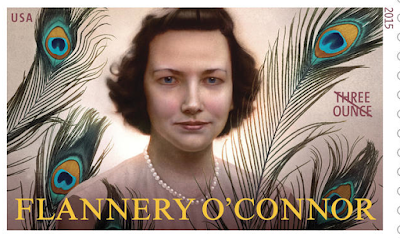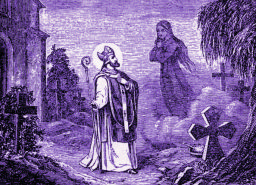Flannery O'Connor wrote as though there were a skull on her desk
Today, I did a piece on Flannery O'Connor in honour of her gracing a new US postal stamp. In 2012, I included her on a list of Amazing Catholic Women Who Changed the World. A proper reading of O'Connor means understanding that she was obsessed with the mortality of the body and the immortality of the soul - that the body will turn to dust but the soul will live forever. It's not an accident that O'Connor would send peacock feathers to her friends and admirers - the peacock is a symbol of the eternal soul.
O'Connor was destined for literary stardom - but she was an outlier Catholic among her peers in the Deep South of Georgia - who were predominantly Bible Belt Protestants. In contradiction to her Protestant peers, she didn't believe that one was instantly "saved" but that a person had to spend their entire life earning their salvation and that the fear of death and contemplation of The Four Last Things made someone a better person. No where is this clearer than one of O'Connor's greatest short stories, A Good Man Is Hard to Find, where the central character is just called 'the grandmother' and never given a Christian name. She indulges her personal failings, but most of all she is very manipulative and on a family vacation she sets in chain a series of events that leads to tragedy. At the end, when she is shot by the misfit, he remarks, 'she would have been a good woman if there had been somebody there to shoot her everyday of her life.' This betrays O'Connor's credo that people must live each moment as if it is their last.
The implicit message from O'Connor being that had the grandmother been more conscious of her own impending death every minute of every day, she would have been a good person.
Listening to O'Connor's voice as she reads A Good Man Is Hard to Find, you can't help but hear this Southern drawl when you read her other quotes such as...
O'Connor was destined for literary stardom - but she was an outlier Catholic among her peers in the Deep South of Georgia - who were predominantly Bible Belt Protestants. In contradiction to her Protestant peers, she didn't believe that one was instantly "saved" but that a person had to spend their entire life earning their salvation and that the fear of death and contemplation of The Four Last Things made someone a better person. No where is this clearer than one of O'Connor's greatest short stories, A Good Man Is Hard to Find, where the central character is just called 'the grandmother' and never given a Christian name. She indulges her personal failings, but most of all she is very manipulative and on a family vacation she sets in chain a series of events that leads to tragedy. At the end, when she is shot by the misfit, he remarks, 'she would have been a good woman if there had been somebody there to shoot her everyday of her life.' This betrays O'Connor's credo that people must live each moment as if it is their last.
The implicit message from O'Connor being that had the grandmother been more conscious of her own impending death every minute of every day, she would have been a good person.
Listening to O'Connor's voice as she reads A Good Man Is Hard to Find, you can't help but hear this Southern drawl when you read her other quotes such as...





Comments
Post a Comment